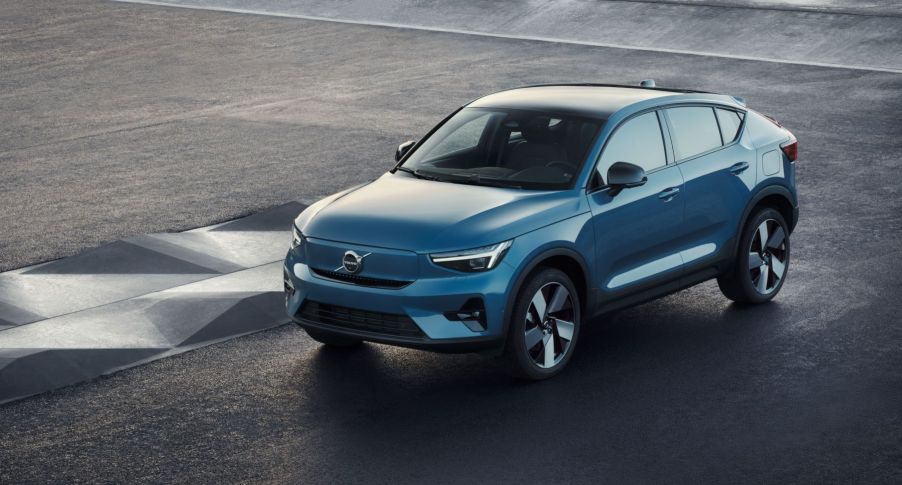
3 Advantages the 2022 Volvo C40 Recharge Has Over the Genesis GV60
The luxury EV market has what many are calling an interesting contribution. The 2022 Volvo C40 Recharge is a hot topic among enthusiasts for a variety of reasons. It’s unique and, according to some, may be challenging the segment in a big way.
So, can the C40 Recharge beat out the competition in the luxury electric space? With rivals like the Genesis GV60, critics may not be confident it can. Still, for luxury EV buyers, comparing new vehicles boils down to the data. If you need a reason to consider the Volvo C40 Recharge, here are three advantages it has over the Genesis GV60.
1. More standard horsepower and torque with the Volvo C40 Recharge

If power and performance matter to you, the Volvo C40 Recharge is a winner. Car and Driver reminds luxury EV buyers that with the Genesis GV60, you can choose between the 314-hp Advanced and the 429-hp Performance trims. Top Electric SUV also lays out the performance specs for the Genesis GV60’s torque levels, which come in at 446 lb-ft for each trim.
In comparison, the C40 Recharge currently rates with more power and torque. Its specs draw serious giddy-up from twin electric engines and the all-wheel drive drivetrain. If you need one reason to choose the C40 Recharge over the GV60, the Volvo can provide 402 horsepower and 487 lb-ft of torque.
For a luxury EV, the Volvo C40 Recharge is super-quick, with a 0 to 60 mph time of a measly 4.5 seconds. It’s also earned test run results, including a 0 to 100 mph time of 10.9 seconds, the quarter-mile run in 12.9 seconds, and clocked a top speed of 112 mph, based on Car and Driver’s tests. Comparatively, the GV60 earned a 0 to 60 mph time of 5.3 seconds and a 0 to 100 mph time of 13.8 seconds.
2. More battery capacity with the Volvo
As Edmunds shares, the 2022 Volvo C40 Recharge has a battery with a little more juice with its 78-kWh capacity. According to Volvo, that battery will allow you to travel up to 261 miles of mixed driving between full charges. In comparison, the Genesis GV60 is projected to drive 235 and 248 miles on a charge, depending on the trim level, says Consumer Reports. The GV60’s battery capacity is also slightly lower than the C40 Recharge, with 77.4 kWh.
3. The Volvo is slightly cheaper
As Genesis describes, the 2023 GV60 is the brand’s first “dedicated electric vehicle,” highlighting the automaker’s efforts to transition toward electrification. If you’re thinking about a GV60 for yourself, you can expect to pay up to $70,000 before the tax credits, depending on how you outfit your luxury EV SUV. Consumer Reports points out that the starting price for a 2023 Genesis GV60 is $58,890, which is slightly higher than the C40 Recharge’s entry-level MSRP. At the entry-level price, you’re getting the entry-level, two-wheel-drive variation.
If you want to buy a 2022 Volvo C40 Recharge, you can do so for $58,750. The C40 Recharge will have a lot of similarities with its cousin, the Volvo XC40 Recharge. However, the C40 Recharge is an entirely new model for the automaker. Depending on how you package yours, you can expect to pay up to $65,000.
Both the Volvo C40 Recharge and the Genesis GV60 are impressive luxury electric SUV contenders. Still, consider these three reasons to go with the Volvo over the Genesis, especially if power, battery capacity, and price points are important to your purchasing decision.


